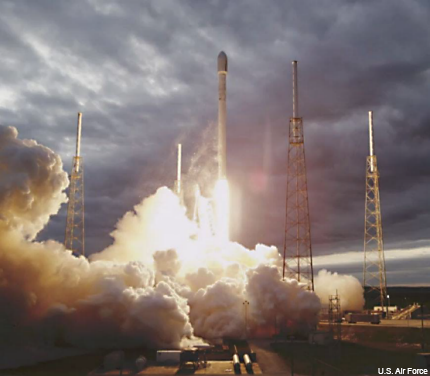Air Force to certify SpaceX for launches by June
The Space and Missile Command has amended a research agreement streamlining EELV certification.

A Falcon 9 rocket launches a communications satellite in January 2014.
The Air Force said it expects to certify Space Exploration Technologies Corp. (SpaceX) to compete for future military satellite launches after amending an R&D agreement covering the service's Evolved Expendable Launch Vehicle (EELV) program.
Air Force Space and Missile Command said the amended agreement with Elon Musk’s SpaceX would streamline the certification process so the upstart company can compete with the United Launch Alliance (ULA) for future Air Force satellite missions. An upgraded version of SpaceX’s Falcon 9 rocket, designated Falcon v1.1, would serve as the baseline configuration for the coming EELV competition, the Air Force said.
The amended R&D agreement "captures important lessons learned along the way about the process and allows the flexibility to certify SpaceX when ready," Lt. Gen. Sam Greaves, the head of Space and Missile Command, said in a statement.
Certification of the Falcon 9 under the revised agreement is expected no later than the end of June 2015, the Air Force command said. SpaceX had filed suit in 2014 contesting the $11 billion sole-source EELV contract to ULA, a joint venture of Boeing and Lockheed Martin. In January, SpaceX agreed to drop the lawsuit, while the Air Force said the company could compete for future contracts once its certification was complete.
"We look forward to completing the certification process and competing for EELV missions," SpaceX President Gwynne Shotwell stated.
In March, the chairman of the House Armed Services' strategic force subcommittee estimated the Air Force had spent nearly $60 million to certify SpaceX to compete for EELV launches. Shotwell told the panel that SpaceX expects to launch its Falcon Heavy booster later this year. The company claims it can deliver payloads to low-Earth orbit for between $150 million to $160 million per flight, considerably less than what ULA is believed to charge per launch.
The Air Force EELV contract calls for supplying 36 rocket cores. ULA CEO Tony Bruno told the House panel that the estimated price per launch would be about $225 million.
The Air Force has not said when it would formally open the EELV competition. In its statement, Space and Missile Command did say, "New entrants will provide future mission assurance support required to deliver National Security Space payloads to specific orbits on a specific schedule with a specific level of risk."
NEXT STORY: Technology takes center stage at DOD Lab Day



